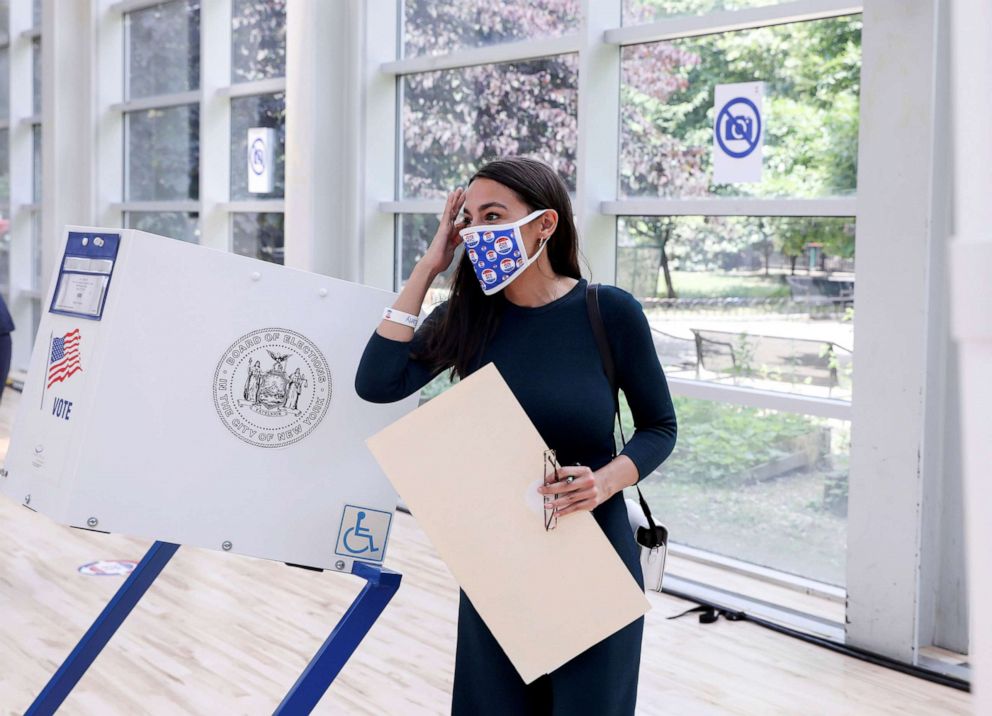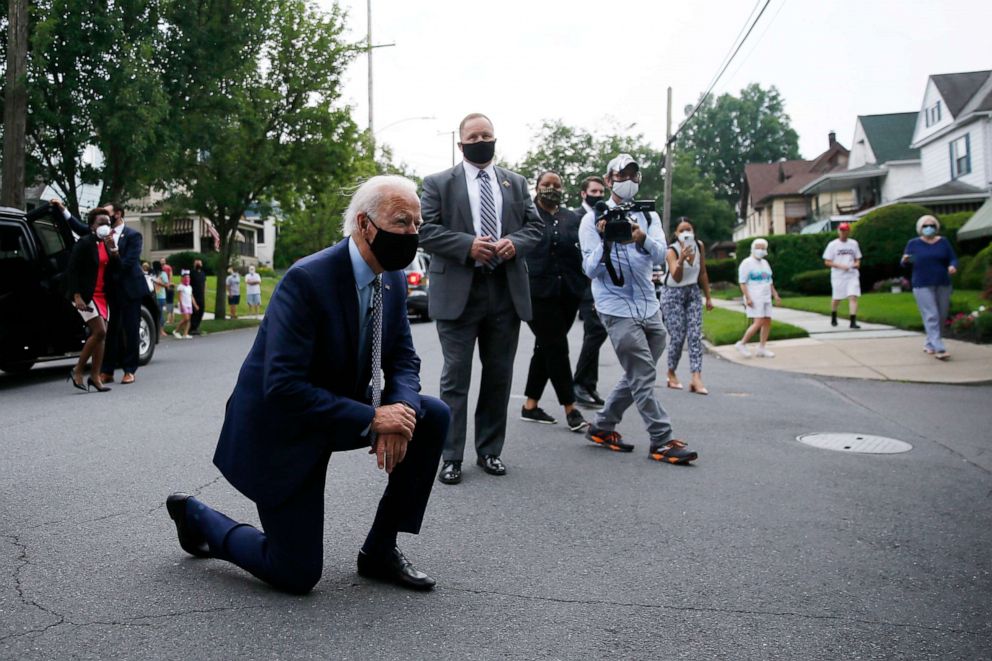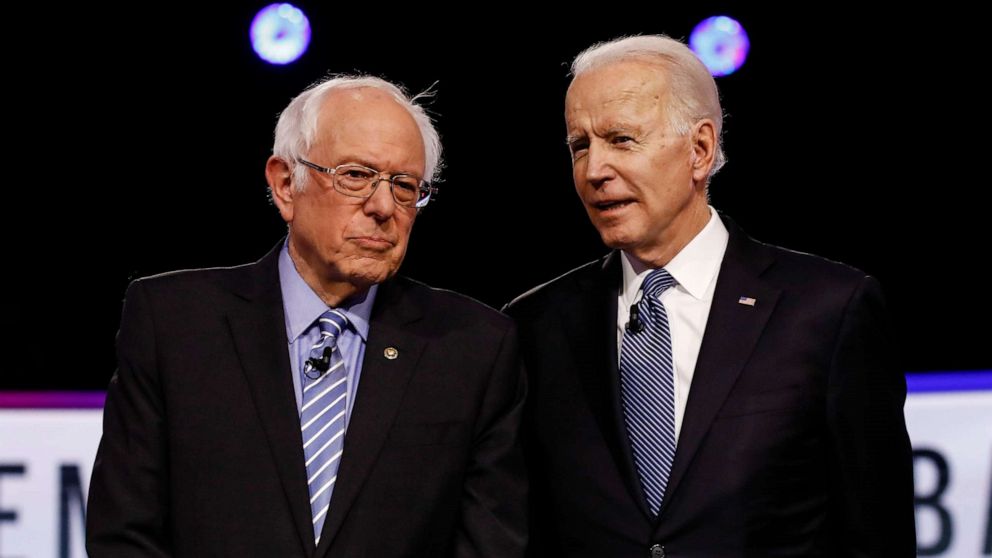Progressives see progress, even as Biden-Sanders task forces fall short of ultimate goals
When Sen. Bernie Sanders ended his presidential campaign and endorsed former Vice President Joe Biden in mid-April, the two men immediately took steps to try and unite the party ahead of a bruising general election campaign against President Donald Trump, announcing they would launch working groups to examine six different policy areas, and bridge the divide between the two wings of the Democratic party.
"It's no great secret out there, Joe, that you and I have our differences. We're not going to paper them over -- that's real. But I hope that these task forces will come together, utilizing the best minds and people in your campaign and in my campaign to work out real solutions to these very, very important problems," Sanders said during the livestream in mid-April.
The following month, six, eight-person teams were announced, pulling together odd-couple pairings of Biden and Sanders allies to tackle policy gaps on health care, climate change, criminal justice reform, immigration and the economy.
Those discussions resulted in a 110-page set of policy recommendations released this week after months of weekly Saturday Zoom calls, offering a detailed roadmap that even the liberal stalwart of the Senate posited has the potential to make Biden the “most progressive president since” Franklin Roosevelt.
"It did not have, needless to say, everything that I wanted. It did not have everything that Biden wanted. But there is no question that on some of the major issues facing this country, if that agenda is implemented, life will improve for tens and tens millions of working people,” Sanders said in an interview on MSNBC, hours after the joint document was released by the Biden campaign.
Some progressives involved in the crafting of the recommendations said that while they’re encouraged by the process that took place, it was clear that Biden’s team went into the talks with clear boundaries about the policies they were willing to embrace.
“I thought it was all-told a very earnest process. I think they didn't make commitments that they didn't feel like they could be held to,” one Democrat involved in crafting the healthcare policy recommendations, who requested anonymity to freely discuss the process, told ABC News. “I recognize that this issue was very clearly litigated in the primary and it was going to be very hard for us to push beyond the framework that they had come to this with.”
On health care, the task force led by Sanders appointee and Washington Congresswoman Pramila Jayapal and Biden appointed former Surgeon General Vivek Murthy called for the establishment of a “high-quality public option plan” that is administered by the government and not private companies, but steered clear of mentioning or advocating steps towards Medicare for All, a hot-button issue during the primaries and a policy that as recently as this week Biden firmly says he does not support.
But despite falling short of even a tacit embrace of Medicare for All, the Democrats involved argued they were able to achieve significant commitments from Biden’s team, and vowed that the progressive movement would continue to pressure the former vice president if he is elected, even if that means the ultimate changes are incremental.
“I'd rather not spend the next four years on defense. I'd rather spend the next four years on offense even if that means the best thing I'm going to do is kick a field goal,” they said.
One area where progressives touted the recommendations: climate change.

The panel dedicated to the issue, which included Rep. Alexandria Ocasio-Cortez and former Secretary of State John Kerry, was able to prod Biden leftward on his timeline for transitioning the American energy infrastructure off of fossil fuels.
“Of course, like in any collaborative effort, there are areas of negotiation and compromise,” Ocasio-Cortez tweeted after the recommendations were released. “But I do believe that the Climate Task Force effort meaningfully & substantively improved Biden’s positions.”
Varshini Prakash, a fellow member of the climate task force from the Sanders camp, and the Co-Founder and Executive Director of Sunrise Movement, a climate change advocacy group, said that overall she felt encouraged that the conversations moved the former vice president forward, but noted there was still room for growth.
“I knew going into the policy discussions we were not going to emerge magically from these discussions with Bernie's Green New Deal in hand,” Prakash told ABC News in an interview.
“There's certainly a lot more to push on, there is certainly a lot more to be done. And I think the purpose of this task force was progress no matter what, with the understanding that we still have a lot of work to do to shift the Overton window, and make much more possible if we want to catch up with the physics of the climate crisis,” she said.
Others engaged in the climate movement also expressed optimism in the wake of the task force's work, but stressed that the more important task is prioritizing the issue if Biden does prevail over Trump in November.
“[These] are a really strong set of recommendations, from a really distinguished set of leaders in this space that provide a really crucial input into the campaign. They did not capture everything. But more importantly, what I would point to is the absolutely critical importance of prioritization,” Sam Ricketts, who headed climate policy for the presidential campaign of Washington Gov. Jay Inslee and co-founded the climate advocacy group Evergreen, told ABC News.
“The idea of having the policy platform to run on that's going to confront this challenge is but the first step. It is going to be most important, I believe, that the Biden campaign and the Biden transition team, then indeed beginning January 20, the Biden administration, and lawmakers around them, as in Congress, prioritize this,” Ricketts added.
But overall, the recommendations represent welcome progress, another former member of Inslee’s team told ABC News.
“Some of our critics were saying, ‘Wow, 2035, that's pretty ambitious, can we do that?' when Jay Inslee rolled this out 18 months ago. And now it looks like that may well be Joe Biden's policy. So it shows a pretty quick movement,” said Jared Leopold, who served as a Senior Advisor to Inslee’s bid.
Still, some progressives characterized the work done by the task forces as a slap in the face and out of step with the movement’s priorities.
“Team Biden is demonstrating a mocking disrespect for voters— denying is even the bare minimum, even when it would help him win. There’s honestly no excuse for it,” Briahna Joy Gray, a former national press secretary for the Sanders campaign tweeted in response to the recommendations, highlighting in particular that the policy did not legalize the use of marijuana federally, but rather decriminalized it.
“It seems really empty and somewhat performative for Joe Biden to be claiming that he really respects his so-called base, that he really is attendant to the needs of the people that elect him to be so overwhelmingly dismissive and cavalier about what would really be a political no brainer,” Gray said Friday in an interview with The Hill TV’s “Rising” of Biden’s reluctance to embrace marijuana legalization.
On criminal justice, the Sanders team pushed very hard on marijuana legalization, abolishing qualified immunity, removing police from schools, and more, according to a source familiar with the negotiations, but the final recommendation did not include those ideas in full.

Despite that, Chiraag Bains, the co-chair of the group from Sanders' wing and a former Justice Department official, reiterated that the policy the group produced did move the ball forward, and that the discussions were “genuine conversations with substantive debate,” and “[spoke] volumes about the way Vice President Biden is approaching things.”
“There are significant advances in what we produced; this platform goes further than anything the Democratic Party has ever put forward before. The task force agreed on literally dozens of policies that go beyond the Vice President’s prior platform. That’s a signal that progressives are having an impact and that there’s unity in the party on transforming our approach to justice,” Bains told ABC News.
Bains noted the commitment to end cash bail, a revenue stream for an unarmed first responder corps, and calls for direct investments in Black and brown communities that have been most harmed by the War on Drugs using savings from prison closures and tax revenue from the legal marijuana industry as some of the areas where progress was made.
“Our work should be seen as a starting point, not the end. With Black Lives Matter, we are in the middle of the largest movement in American history, and it’s not slowing down anytime soon. Public policy needs to be bold enough to meet the demands for justice echoing across the country. Absolutely, we all have a responsibility to keep pushing the conversation,” he added.
On immigration, too, a host of progressive groups praised the task force’s recommendations, which focused heavily on reversing many of President Trump’s policies but stopped short of some more progressive ideas, as a “step in the right direction,” but made it clear they are expecting more from Biden, especially if it makes it to the White House.
“While these recommendations are a good start, they are not enough. We need a clear articulation of support from the Vice President along with an understanding that support is only the first step — prioritizing action early in his administration is the second, more critical one,” a joint statement released by eight immigration advocacy organizations released on Friday, including the Service Employees International Union, UnidosUS Action Fund and United We Dream Action, read.
The disappointment for some progressives about what the groups accomplished is understandable for Prakash, who said while the agreement fell short of the big progressive goals some candidates advocated for in the primary, the conversations could help pave the way for bolder leadership of the future.
“I hear you and it being frustrating [it’s] perhaps not the most ambitious, progressive thing that we wanted,” she said of those disappointed in the outcome. “The truth is we didn't have enough power as the progressive movement in this moment to get the candidate of our choice--whether that be Bernie Sanders or Elizabeth Warren, or whoever--to be President of the United States, and now we have [Vice] President Biden.”
“We need to continue building for the long term so that the ability to have a President Sanders or someone like him in the future becomes a political inevitability. If we can exist at that table with folks on the Biden side with integrity, with our eyes on the prize, with our vision, and with a strong understanding of what we have achieved and where we fall short, I think it is always worth being at the table,” Prakash added.
That relationship at the table between the different camps, according to another source with knowledge of the Biden-Sanders task forces, is a stark difference from the past mergers of top candidates.
“This is the polar opposite of what the Clinton experience was in 2016, which was always contentious and always problematic,” the source said.
“I think Joe Biden will adopt some aspects of Bernie's progressive platform. The fact that they entered into this process, says one of two things; it either says that Biden is truly open to including progressive voices, or he's just bullsh----- everybody. Either is totally possible.”




